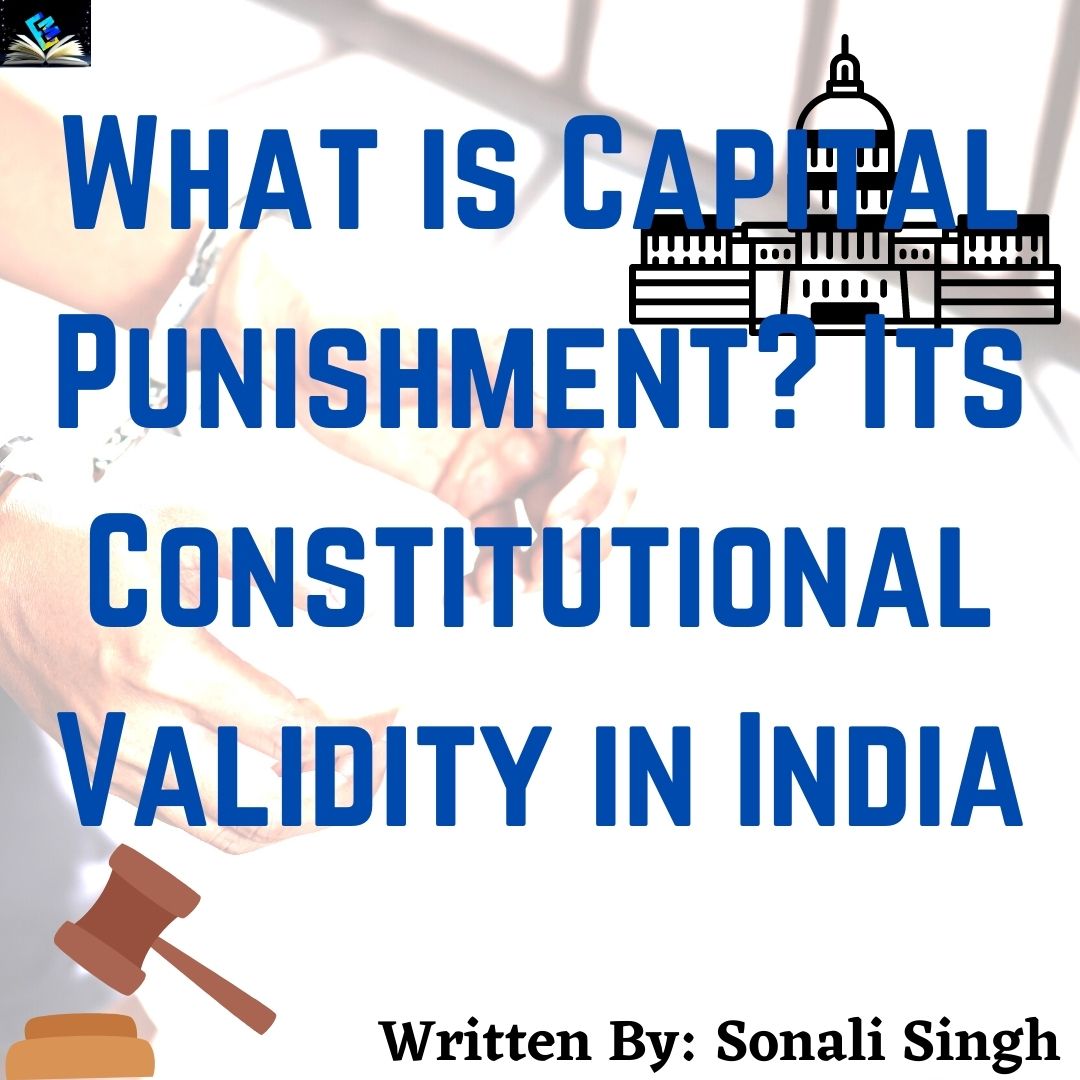
What is Capital Punishment? Its Constitutional Validity in India
Keywords: Capital Punishment, Punishment, Death Penalty, Rarest of Rare, Constitutional
AUTHOR: SONALI SINGH
Introduction
All punishments are based on the same premise: there must be a consequence for transgression. The majority of religious and ethical systems teach that wicked actions have unpleasant consequences. There are two basic reasons for punishing wrongdoers: it deters others from doing wrong and it deters the wrongdoer from doing so again. The death sentence is based on the same premise as other forms of punishment. It is much more subject to controversy over its justice, appropriateness, and effectiveness than other penalties because of its extreme and irreversible character. Death penalty supporters believe that it is an effective approach to deter crime. They emphasize the death penalty as a deterrent or as a tool to prevent or reduce crime. They feel that the death sentence is the justest way to deal with criminals.
Since the dawn of time, the death sentence has been used as a form of punishment. The reasons for and against have remained mostly unchanged over time. Crimes, as well as how they are punished, are linked to the culture and civilization from which they emanate. At this point, when the debate over whether or not death punishment should be abolished is still raging. It’s important to remember how legislatures and the Supreme Court have dealt with this problem in the past. Another point to consider is the scope of judicial discretion.
CAPITAL PUNISHMENT: WHAT DOES IT MEAN?
Capital punishment, according to the Oxford Dictionary, is the legally sanctioned killing of someone as a punishment for a crime.
(1) Capital punishment is the death penalty imposed for crimes involving planned murder, numerous murders, repeated crimes, rape and murder, and other offenses for which the criminal provisions consider the perpetrators to be a grave threat to society’s existence and impose the death penalty.
(2) Capital punishment, also known as the death penalty, is a legal process used by the state to punish criminals.
DEATH PENALTY’S HISTORICAL BACKGROUND
The death penalty is a long-established sanction. There is almost no country on the planet that has never used the death sentence. The history of human civilization indicates that capital punishment has never been abolished as a form of punishment. Under the Laws of Draco (7th century BCE), capital punishment for murder, treason, arson, and rape was commonly practiced in ancient Greece. While Plato thought that it should only be applied to the incorrigible. It was also used by the Romans for a wide range of crimes, though citizens were exempted for a brief while under a republic.
This is backed up by Sir Henry Marine’s comment that the “Roman Republic did not abolish the death penalty, while its non-use was principally directed by the practice of punishment or exile and the procedure of questions.”
INDIA’S CONSTITUTION AND THE VALIDITY OF THE DEATH PENALTY
The death penalty has been debated, analyzed, and examined for a long time, but no consensus can be formed on whether it should be kept or removed. From the dawn of time, the death penalty has been a method of punishment used to eliminate offenders and as a punishment for the most egregious crimes.
Various countries have diverse perspectives on crime in various ways. In Arab countries, the retributive punishment of “an eye for an eye” is used. But in other countries, deterrent punishment is used. In India, for example, there has been a recent shift toward restorative and reformist methods of punishment.
India is one of 78 countries that have retained the death penalty, claiming that it will only be used in the “rarest of rare conditions” and for “special reasons”. Neither the legislation nor the Supreme Court has specified what a rarest of the rare situation or unique reason is.
Judgements
The constitutional validity of the death penalty has been questioned in several cases, the most recent of which was JAGMOHAN SINGH V. STATE OF U.P.[1], in which the Supreme Court rejected the argument that the death penalty is a violation of the “right to life” guaranteed by Article 19 of the Indian constitution. In another case, Rajendra Prasad v. State of Uttar Pradesh[2], Justice Krishna Iyer emphatically emphasized that the death sentence is a violation of articles 14, 19, and 21 of the Constitution.
However, in the landmark case of Bachan Singh v. State of Punjab[3], the Supreme Court reversed its earlier ruling in Rajendra Prasad by a majority of 4 to 1 (Bhagwati J. dissenting). It stated that the death penalty as an alternative punishment for murder is not unreasonable and thus violates articles 14, 19, and 21 of the Indian Constitution. Because the “public order” contemplated by clauses (2) to (4) of Article 19 is distinct from “law and order”. It also stated that the death penalty should be applied only in the “rarest of rare cases.” In Machhi Singh v. State of Punjab[4], the Supreme Court outlined the broad limits of when a death sentence should be imposed.
Opinion of Supreme Court
Similarly, the Supreme Court has expressed its opinions on the death sentence and its constitutionality in many other cases. However, in India, the death penalty is applied; Mohammed Ajmal Kasab was sentenced to death not long ago. The Pakistani gunman convicted in the 2008 Mumbai bombings was condemned to death by hanging on November 21, 2012, after much discussion, politics, and argument. Next in line is Afzal Guru, who was convicted in the 2001 Parliamentary attacks and was likewise hanged on 9 February 2013 after a lengthy political debate. Devendra Pal Singh Bhullar, a 1993 car bombing convict. Will be executed in the coming days after his mercy petition was denied by the Supreme Court.
In India, there has been a wide range of opinions on the death penalty. With some advocating for its continued use and others advocating for its abolition. Those in support of death penalty say that it should only be used for the most terrible and rarest of crimes. Such as the Delhi gang-rape case, where the demand for the accused’s death punishment was increased. However, opponents of the death penalty contend that it is a humane and heartless investment by an uncertain and unkempt society on religious, moral, and ethical grounds. It has also been suggested that it be replaced with life imprisonment or any other alternative.
CONCLUSION
For far too long, the death sentence has been attacked without any grasp of its complexities. It has been heavily criticized for arbitrariness, irreversibility, and violations of human rights. The death penalty, on the other hand, passes muster on all points. In India, the capital penalty is not only constitutionally valid but is also supported by several court rulings. To abolish capital punishment in a country like India, the public’s attitude toward it must alter. The public should believe that justice can be served even if persons are not officially assassinated. Just a majority of Indians believe that capital punishment is not necessary to attain justice. And only a few laws and legislations will bring about change. If that is done, it will be successful. If this is done, it will only result in further alienation from the state and increased distrust of the legal system.
[1] State of Uttar Pradesh vs. Jagmohan Singh (1973) 20 SCC 1
[2] AIR 1979 SC 917, Rajendra Prasad vs. State of Uttar Pradesh.
[3] Bachhan Singh vs. Punjab State, 3 SCC 727 (1979).
[4] AIR 1983 SC 957, Machhi Singh vs the State of Punjab.
Mail us at edumoundofficial@gmail.com






